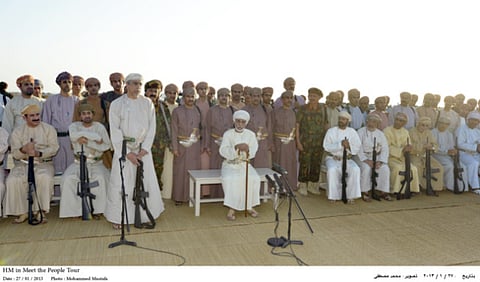Oman leader takes stock of immigration issues
Qaboos raises concerns about illegal immigrants and burgeoning expatriate workforce

Muscat: Oman’s Sultan Qaboos Bin Saeed has raised concerns about the problem posed by “boat people”, the rise in the number of people reported absconding as well as the increasing expatriate workforce in the country.
Sultan Qaboos, during his meeting with the Shaikhs and dignitaries from the Central and Interior region on Sunday at the royal camp at Saih Al Shamikhat in Bahla, urged increased vigilance against illegal immigration.
“It [illegal immigration] has become almost a daily occurrence. The illegal immigrants come by boat, and these matters have to be tackled in a moderate manner that would not annoy the countries from which these groups of illegal immigrants hail,” Sultan Qaboos said.
“This is a worrying thing, but it is unavoidable,” Sultan Qaboos said while expressing confidence in the departments concerned to tackle illegal immigration.
For almost a decade now, Oman has been trying to head off human traffickers who take advantage of its 1,600-km coastline, especially along the northern coast, to bring in illegal immigrants by boat. Most of the illegal immigrants come from Pakistan and Afghanistan, besides some from Iran.
The authorities have enforced a tough policy on illegal immigrants but, even so, the problem has persisted.
“It takes time to deport them, they are a burden on the government and the security departments in the state. It costs the government and it does not bring any benefits in any way,” Sultan Qaboos said as he also took note of the issue of absconding expatriate workers. He also sought to dwell on the expatriate manpower in the country, terming it a burden on the state security organisations and finances.
Shaikh Qaboos asked Omani citizens to limit their requests for expatriate manpower. “There will be decisions and measures to limit this because it is time to take decisive action,” he stressed.
The Omani leader said expatriate manpower in the country had increased beyond desirable levels but acknowledged that expatriates were a critical factor in Oman just as in other countries where their expertise was valued. “The ratio we considered was always between 30 to 33 per cent of the population at the current time. The expatriates are required because the [citizen] workers still prefer certain jobs. Insha Allah, the Omani manpower will be present in all professions and projects,” Sultan Qaboos said.
Talking about government income and spending, Sultan Qaboos said there was no personal income tax in Oman. “The funds that come to the state treasury are collected from the company income taxes and not from personal income although many advanced industrial countries collect taxes on personal income. They give from one side and take from the other,” he said.
“The company income tax is only of certain size, thus the government supports the companies to expand to achieve two main goals, namely to absorb more national manpower and increase their capitals, because the more the capital is, the more the income tax is,” he said.
Shaikh Qaboos said that he sometimes wondered about requests from some people. “They do not think where the funds will come from to build roads or hospitals or schools. If we look at the road network in Oman, we will find that it costs very high due to the topography of the country. Despite this we allocate the funds to build these roads as they benefit the citizen. We should be patient because nothing is done overnight.”
Sign up for the Daily Briefing
Get the latest news and updates straight to your inbox



